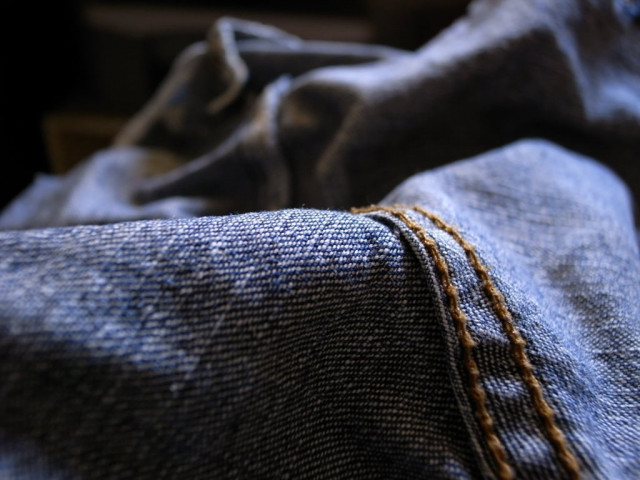Water-stressed: ‘Pakistan should grow potatoes, not make jeans’
A pair of blue denim jeans takes 2,900 gallons of water to make in Pakistan.

A pair of blue denim jeans takes 2,900 gallons of water to make in Pakistan. PHOTO: FILE
A pair of blue denim jeans takes 2,900 gallons of water to make in Pakistan. The bulk of it goes into growing the cotton. And while today Pakistan is the largest exporter of denim, using this much water for one pair of jeans is paying too high a price. We earn a fraction of the $300 they sell for at Macy’s in New York. Growing potatoes takes only 31 gallons of water.
This comparison was used by Adnan Asdar to drive home the magnitude of our water crisis to students at the Indus Valley School of Art and Architecture. The CEO of Multinet, a structural engineer by training, has been involved in international water advocacy. His forceful talk was the opening act to get students excited about the presentation on the challenges to the Indus River basin by Erum Sattar, who is pursuing a doctorate at Harvard University and is a Water Fellow with the Harvard Water Security Initiative (see its website for a .pdf of her presentation). Her goal on Thursday was to invite more creative young minds to apply themselves to this area.
This generation should know that there is no ‘planet B’ option for Pakistan, as Asdar put it. We are, fortunately enough, well located in the ‘Third Pole’, the Hindu Kush-Himalayan region that has more snow and ice than anywhere outside the Polar Regions. But climate change, water sharing with India and the way we (mis)manage our own water mean that we have become a water-stressed country. Water-logging and salinity and lowering groundwater levels because of irrigation and tube wells do not help.
Dams and water storage are part of the answer. But here too Asdar brought up a comparison: At Partition Pakistan had 1 dam and India 344. By 2010, Pakistan had only 143 dams and India 4,340.
So, unless we figure out our disputes with India, it will be “game over” for Pakistan, warned Asdar. But guess how interested Pakistan has been. In 2008 when the International Court of Arbitration was hearing the dispute over India building a dam on the Jhelum, Pakistani officials didn’t even turn up. India was there in full strength with its lawyers, engineers and secretaries. The court decided in its favour. We were busy haggling over plane tickets to The Hague.
Now Indian hydropower projects on the Chenab are going to put stress on the Indus Water Treaty of 1960. This World Bank-mediated agreement was signed after India stopped water flowing from its canals to Pakistan shortly after Partition. The agreement divided the use of rivers and canals between the neighbours. Pakistan got three rivers as did India.
And in our own backyard, the federal and provincial governments will have to also talk about, say the Kalabagh Dam, and how without reservoirs we can’t store water.
The talk was organised by Asst. Prof. Aliya Iqbal of the Liberal Arts faculty.
Published in The Express Tribune, August 30th, 2013.



















COMMENTS
Comments are moderated and generally will be posted if they are on-topic and not abusive.
For more information, please see our Comments FAQ